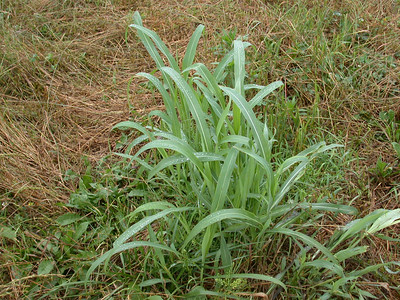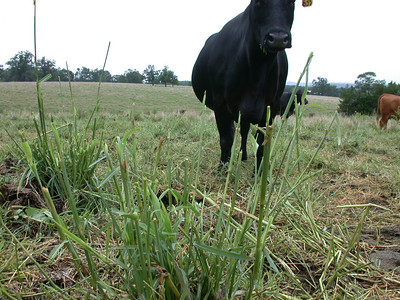Agriculture and Natural Resources Blog
Contact
Professor and Extension Forage Specialist
Phone: (501) 671-2350
Email: jjennings@uada.edu
University of Arkansas
Division of Agriculture
Cooperative Extension Service
2301 S. University Avenue
Little Rock, AR 72204
What is the difference between Prussic Acid and Nitrate Toxicity in forage?
John Jennings, Professor and Extension Forage Specialist

The current stretch of hot, dry weather is very concerning for pastures. We are getting a lot of questions about prussic acid and nitrate in johnsongrass and other forages. Here are some points about the differences between prussic acid and nitrate.
- With current conditions, prussic acid toxicity may be a higher concern than nitrate. Reasons for this include wilted johnsongrass and sorghum/sudan due to hot dry weather, short plants due to drought, and lack of N fertilizer applied in many cases.
- Johnsongrass is a good quality forage, but when it becomes stressed from drought, it can produce prussic acid (hydrocyanic acid) or can accumulate nitrate, both of which are very toxic to livestock. Sorghum/sudan (including haygrazer, greengraze, sudangrass, and sorghum) also can develop prussic acid and accumulate nitrate.

What is the difference in these toxins and can toxicity levels be measured?
Prussic Acid
It is difficult to predict how much prussic acid toxin may be present in the forage. There are no reliable field or routine laboratory tests for measuring toxic levels of prussic acid in forage. Lab tests can confirm prussic acid poisoning for dead animals, but the amount of toxin that results in death has not been established for any routine tests and reliable field testing is not available. Consult FSA 3069 Prussic Acid for more information.
- Hydrocyanic acid (HCN) or prussic acid is generally found in stressed johnsongrass or sorghum and is formed by enzymatic action on compounds called cyanogenetic glucosides. When these compounds are broken down in the rumen, the cyanide is absorbed and combines with the hemoglobin in the bloodstream. This prevents the red blood cells from releasing oxygen to the body tissues and suffocation occurs. One diagnostic symptom of prussic acid poisoning is bright red blood since it is full of trapped oxygen. Prussic acid poisoning occurs rapidly with affected animals dying in the field.
- Johnsongrass and any plants of the sorghum family can develop prussic acid. Wilted leaves of wild cherry trees caused by storm damage or trimming/cutting also have high prussic acid potential.
- Frosted, wilted, or drought-stressed plants are most likely to develop prussic acid. During early drought stress, the grass may appear normal in the morning but can wilt during afternoon heat which increases toxic potential.
- Do not allow animals to remain in pastures with johnsongrass at night when frost is likely.
- The amount of prussic acid is higher in young plants than in older ones, and the toxicity of leaves is higher than that of stems. Prussic acid poisoning potential is very high for short johnsongrass forage (less than 18” tall), wilted forage, or for a new flush of growth soon after a rainfall or after hay cutting. Prussic acid potential decreases as the plants become taller and more mature.
- Many producers believe the white powdery substance commonly seen on johnsongrass stems in late summer is prussic acid residue, but it is only a common powdery mildew fungus and is not considered toxic to livestock.
- Prussic acid dissipates when the forage dries, so well-cured hay is considered safe. If johnsongrass patches are mowed before allowing animals to graze a pasture, make sure the cut johnsongrass is dried completely to allow the prussic acid to dissipate.
Nitrate
Laboratory and field tests can be conducted on fresh forage and hay for nitrate content. Nitrate concentration of 700 ppm of nitrate-nitrogen (NO3-N or less) is considered safe. Field tests with a diphenylamine solution can be used to indicate the presence of nitrate to help determine if lab testing is needed to confirm nitrate concentration. Consult FSA 3024 – Nitrate Poisoning in Cattle for information on toxicity levels.
- Nitrates can accumulate to toxic levels in some plant species, especially during drought stress. Plants known for nitrate accumulation include johnsongrass, sorghums (forage sorghum, sorghum-sudan, and sudangrass), pearl millet, corn, and pigweed. Drought, shade, and sometimes potassium deficiency can cause a reduction in the activity of a specific plant enzyme that functions in the conversion of nitrate to precursors of plant protein, which allows the accumulation of nitrate.
- Nitrate poisoning causes internal suffocation of the animal similar to prussic acid poisoning, however, nitrate prevents the blood from picking up oxygen to carry to the tissues. A diagnostic symptom of nitrate poisoning is dark, chocolate-brown appearing blood which is a result of lack of oxygen.
- High nitrates usually occur when forages have been heavily fertilized with nitrogen fertilizer, but can also occur after poultry litter application or in fields with a history of manure application.
- High nitrate levels are most likely in young immature plants and decline as the plants mature. But, in cases of very high nitrate content, levels may remain high even in mature plants.
- Nitrate levels are typically highest in the lower part of the plant stem/stalk.
- High nitrate levels do not dissipate when hay is cut and remain high even in dry hay and in dry standing forage after a killing frost.
- Nitrate levels may decrease by about 50% in silage/haylage during the fermentation process. Be reminded that this may not be enough to reduce very high nitrate forage to safe levels.
Additional Resources
See the webpage on nitrate and prussic acid poisoning in cattle for additional resources. You can contact your county extension office for more information.